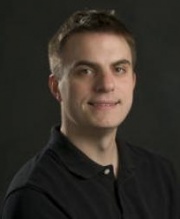| Please visit our ***NEW*** OBF/BOSC website: https://www.open-bio.org/ |
-
Difference between revisions of "BOSC 2014 Keynote Speakers"
(→C. Titus Brown) |
(→C. Titus Brown: italics) |
||
| Line 27: | Line 27: | ||
Dr. Brown's topic is "A History of Bioinformatics (in the year 2039)". | Dr. Brown's topic is "A History of Bioinformatics (in the year 2039)". | ||
| − | ''In 2039, I expect to look back at the last 25 years of biology and see | + | ''In 2039, I expect to look back at the last 25 years of biology and see both wonderful surprises and missed opportunities. In this talk, I will attempt to predict both some surprises and some of the opportunities I worry that we will have missed over the next 25 years.'' |
| − | both wonderful surprises and missed opportunities. In this talk, I will | ||
| − | attempt to predict both some surprises and some of the opportunities I worry | ||
| − | that we will have missed over the next 25 years.'' | ||
---- | ---- | ||
[[BOSC_2014|Back to BOSC 2014 home page]] | [[BOSC_2014|Back to BOSC 2014 home page]] | ||
Latest revision as of 13:23, 26 April 2014
BOSC 2014 is pleased to announce the following keynote speakers:
Philip Bourne
Philip E. Bourne PhD is the Associate Director for Data Science at the NIH and formerly Associate Vice Chancellor for Innovation and Industry Alliances, and Professor of Pharmacology at the University of California San Diego. Bourne's work at the NIH focuses on accelerating the rate of knowledge discovery from the ever increasing amounts of biomedical data at all scales – from genomes to populations.
Bourne's laboratory focuses on relevant biological and educational outcomes derived from computation and scholarly communication. This implies algorithms, text mining, machine learning, metalanguages, biological databases, and visualization applied to problems in systems pharmacology, evolution, cell signaling, apoptosis, immunology and scientific dissemination. He has published over 300 papers and 5 books, one of which sold over 150,000 copies. Previously he co-founded 4 companies: ViSoft Inc., Protein Vision Inc., a company distributing independent films for free and most recently SciVee. Bourne is the co-founder and founding Editor-in-Chief of the open access journal PLOS Computational Biology.
Bourne is a Past President of the International Society for Computational Biology, an elected fellow of the American Association for the Advancement of Science (AAAS), the International Society for Computational Biology (ISCB) and the American College of Medical Informatics.
Bourne is committed to professional development through the Ten Simple Rules series of articles and a variety of lectures and video presentations. Awards include: the Jim Gray eScience Award (2010), the Benjamin Franklin Award (2009), the Flinders University Convocation Medal for Outstanding Achievement (2004), the Sun Microsystems Convergence Award (2002) and the CONNECT Award for new inventions (1996 & 97).
Dr. Bourne will speak about "Biomedical Research as an Open Digital Enterprise":
The biomedical research lifecycle is fast becoming completely digital and increasingly open to the point that publishing could simply become changing the access control on given research objects comprising ideas, hypotheses, data, software, results, conclusions, reviews, grants and so on. This offers immense opportunities for software developers to enable the enterprise. I will describe a vision for the digital enterprise and what the NIH and others are doing to support the notion with the intent to accelerate scientific discovery.
C. Titus Brown
C. Titus Brown is an assistant professor in the Department of Computer Science and Engineering and the Department of Microbiology and Molecular Genetics. He earned his PhD ('06) in developmental molecular biology from the California Institute of Technology. Brown is director of the laboratory for Genomics, Evolution, and Development (GED) at Michigan State University. He is a member of the Python Software Foundation and an active contributor to the open source software community. His research interests include computational biology, bioinformatics, open source software development, and software engineering.
Dr. Brown's topic is "A History of Bioinformatics (in the year 2039)".
In 2039, I expect to look back at the last 25 years of biology and see both wonderful surprises and missed opportunities. In this talk, I will attempt to predict both some surprises and some of the opportunities I worry that we will have missed over the next 25 years.

